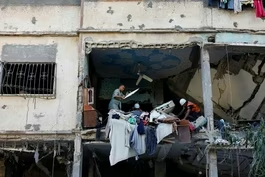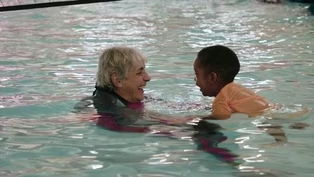
UN aid chief hopes to increase flow of supplies to Gaza
Clip: 10/21/2023 | 6m 46sVideo has Closed Captions
UN aid chief hopes to increase flow of critical supplies to Gaza
Twenty trucks of humanitarian aid crossed into Gaza from Egypt on Saturday, the first life-saving supplies to reach Gazans since the Israel-Hamas war began. Before the Oct. 7 attack by Hamas, 450 trucks of aid arrived daily in Gaza. UN aid chief Martin Griffiths joins Lisa Desjardins to discuss what this new aid means for the humanitarian crisis in Gaza.
Problems playing video? | Closed Captioning Feedback
Problems playing video? | Closed Captioning Feedback
Major corporate funding for the PBS News Hour is provided by BDO, BNSF, Consumer Cellular, American Cruise Lines, and Raymond James. Funding for the PBS NewsHour Weekend is provided by...

UN aid chief hopes to increase flow of supplies to Gaza
Clip: 10/21/2023 | 6m 46sVideo has Closed Captions
Twenty trucks of humanitarian aid crossed into Gaza from Egypt on Saturday, the first life-saving supplies to reach Gazans since the Israel-Hamas war began. Before the Oct. 7 attack by Hamas, 450 trucks of aid arrived daily in Gaza. UN aid chief Martin Griffiths joins Lisa Desjardins to discuss what this new aid means for the humanitarian crisis in Gaza.
Problems playing video? | Closed Captioning Feedback
How to Watch PBS News Hour
PBS News Hour is available to stream on pbs.org and the free PBS App, available on iPhone, Apple TV, Android TV, Android smartphones, Amazon Fire TV, Amazon Fire Tablet, Roku, Samsung Smart TV, and Vizio.
Providing Support for PBS.org
Learn Moreabout PBS online sponsorshipLISA DESJARDINS: The 20 trucks of humanitarian aid that crossed into Gaza from Egypt today were the first life-saving supplies to reach Gazans since the war between Hamas and Israel began, but before this month attacked by Hamas, 450 trucks of aid arrived in Gaza daily.
Earlier, I spoke to Martin Griffiths, the U.N.
Undersecretary General for Humanitarian Affairs and emergency relief about what this new aid means for the humanitarian crisis.
MARTIN GRIFFITHS, Emergency Relief Coordinator, United Nations: You know, the only thing 20 truckloads of aid can do apart from no doubt, save some lives.
And there's nothing better than saving a single life, I think, as we all know, is to show the world this can be done.
You can deliver aid to Gaza, the fact that we could get in even 20, which is very, very few tracks of aid into Gaza.
So that beleaguered tragic population means we can do it again, again, and again and again.
LISA DESJARDINS: So that leads to the next question.
I know there are scores of trucks lined up waiting to get in with more aid.
Help us understand the negotiations, the challenges, and Sure.
Is there going to be an opening for those soon?
MARTIN GRIFFITHS: Well, I really hope so I hope that I hope we'll have more deliveries tomorrow.
We're still as we speak tonight here in Cairo.
We're deep in negotiation with the different authorities about this.
We want to get in 2030 trucks tomorrow if we possibly can.
We want to go up day by day by day.
We have a target either way of getting up to 100 trucks a day.
But the issues that we have to resolve are really quite simple to understand and not easy to negotiate.
Number one, we have to agree with the Israelis in particular, but also with other parties.
What kind of inspection regime there will be to make sure that our trucks aren't going to carry aid in which is to do with a war no guns, thank you very much.
But number two, we want to be able to be sure that the humanitarian aid we deliver is delivered according to and respecting what's called the rules of war.
People should be allowed to decide where they travel, when they travel, if they travel, and where they feel safe.
So, those two things we are negotiating with all concerned.
If we can get them right and I think we will get them right and we're getting a lot of help from a lot of countries, we can start moving up that number of tracks from 20, to 30, to 40, to 50, eventually to the 100.
LISA DESJARDINS: How would you describe the humanitarian crisis right now in Gaza and where it's headed, if there isn't more aid soon?
MARTIN GRIFFITHS: One of the things that I find most terrifying about Gaza is the absolute uncertainty of what's going to happen.
People don't know, if they're going to have to move out of the north, people don't know where they're going to have to go to live in the south.
People don't know when the military operation will start.
People don't know if trucks are going to arrive.
And if they do, how long, they're going to have to wait for the next one.
Uncertainty breeds terrible insecurity, it breeds distress.
And it is a stress on life.
And it is our job as your representatives, frankly, from the international community, to try to reduce that uncertainty.
And to tell people, there will be breakfast tomorrow, where you live, it's kind of that simple.
LISA DESJARDINS: Is there a starvation risk?
I've heard some other officials say that that's real there in Gaza.
MARTIN GRIFFITHS: There will be.
There will be.
But the first risk, which is a killer, is developers, your water and the fuel that's needed to move water, you know, to make generators work, to move water so that hospitals work, clinics work, schools work and so forth.
If you don't have water, you know, as well as I do, you do not survive.
Now, UNRWA, which is this amazing U.N. organization, which knows Gaza backwards, has cut its water rations from 15 liters per person per day, down to one liter per person per day.
And when the fuel runs out, and the water runs out, you're not going to survive.
LISA DESJARDINS: Once you are able to get through negotiations once you're able to get the aid and how do you ensure that it can be secure, either from being in a target zone by Israelis or at threat from Hamas, or that workers won't be overrun by crowds?
MARTIN GRIFFITHS: Well, you know, the tragic truth of the world that you and I live in today is it's full of places that you can't be damn sure about any of those things.
First of all, we have 75 years of experience in Gaza.
We know that communities.
We believe that communities can trust us.
We want that to be maintained, so that we know where they will be safe, and we will go where they need to go.
That's the first thing.
Number two, we will insist on a diplomacy.
Your president has done an amazing job this week here in the region, in insisting on why international humanitarian law is not an optional extra, or another law to apply.
It's the bedrock, without people manage conflict humanely.
So we know.
We have law behind us.
We have diplomacy behind us.
We have the rights of people behind us, and we have the passion.
And if I may be so bold, the courage of humanitarian workers, we're not useless.
We're not without opportunities to do the job properly.
But we have a hell of a job to do here.
LISA DESJARDINS: You have a hell of a job indeed.
Martin Griffiths, the U.N. humanitarian lead, we thank you for your time and we are going to keep in very close touch.
MARTIN GRIFFITHS: Thank you so much, really appreciate it.
Have a good program.
Advice for talking with kids about the Israel-Hamas war
Video has Closed Captions
Clip: 10/21/2023 | 6m 12s | A child psychologist’s advice for talking with kids about the Israel-Hamas war (6m 12s)
Aid arrives in Gaza as Israel prepares to step up attacks
Video has Closed Captions
Clip: 10/21/2023 | 3m 53s | Humanitarian relief arrives in Gaza as Israel prepares to step up attacks (3m 53s)
Swim safety advocates aim to undo historic racial inequities
Video has Closed Captions
Clip: 10/21/2023 | 4m 49s | Swim safety advocates aim to overcome historic racial inequities (4m 49s)
Providing Support for PBS.org
Learn Moreabout PBS online sponsorship
- News and Public Affairs

FRONTLINE is investigative journalism that questions, explains and changes our world.

- News and Public Affairs

Amanpour and Company features conversations with leaders and decision makers.












Support for PBS provided by:
Major corporate funding for the PBS News Hour is provided by BDO, BNSF, Consumer Cellular, American Cruise Lines, and Raymond James. Funding for the PBS NewsHour Weekend is provided by...


